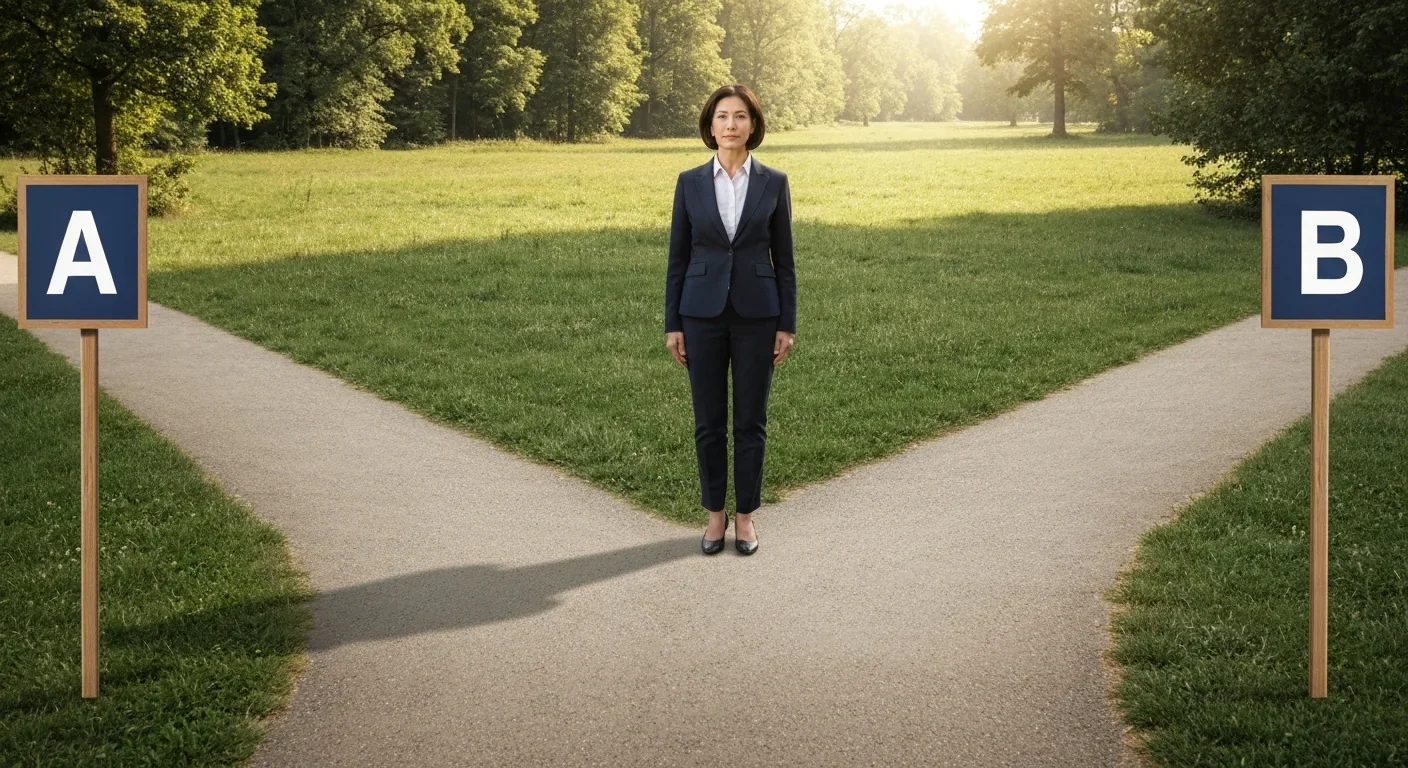Why We Pick Sides Over Nothing: Instant Tribalism Science

TL;DR: We constantly misjudge people by attributing their behavior to personality while ignoring powerful situational factors - a cognitive bias called the fundamental attribution error. Understanding this psychological shortcut can transform relationships, workplace dynamics, and social interactions.
You're stuck in traffic when someone cuts you off without signaling. "What a jerk," you think instantly. But when you accidentally cut someone off next week because you're rushing your sick kid to the doctor, you know you're not a bad person - you just had no choice. Welcome to one of psychology's most persistent tricks: the fundamental attribution error.

The fundamental attribution error is our brain's default setting for judging human behavior. When we watch others act, we assume their actions reveal their true character. Cut someone off in traffic? You're selfish. Snap at a coworker? You're mean. Post something controversial? That's who you really are.
But here's the twist: when we do these same things, we immediately see the situational pressures that forced our hand. We had a migraine. Our boss was unreasonable. The algorithm showed us misleading information first.
Psychologist Lee Ross coined the term in 1977, building on research by Edward Jones and Victor Harris from a decade earlier. They discovered something unsettling: even when people knew someone's behavior was entirely dictated by chance - literally determined by a coin flip - they still attributed personality traits to that person.
In the original experiment, participants read essays either supporting or opposing Fidel Castro. Some writers chose their position freely, while others were assigned their stance by random coin toss. The rational response? Recognize that assigned writers' essays revealed nothing about their actual beliefs. But participants rated writers who defended Castro as genuinely more pro-Castro, even when explicitly told a coin toss made the decision.
Even when people are explicitly told someone's behavior was determined by random chance, they still judge that person's character based on that behavior.
The error has persisted in hundreds of subsequent studies. We judge the stressed parent in the grocery store, the overwhelmed customer service rep, the exhausted colleague who forgot to reply. We see personality where context would explain everything.
Understanding why we make this mistake requires looking at how human cognition evolved. Our ancestors needed quick assessments of whether someone was friend or threat. Analyzing complex situational factors took precious time - time you didn't have if someone might be dangerous.
Modern psychology reveals three mechanisms that keep this bias alive:
Perceptual salience makes the person acting the focus of our attention, while situational factors fade into background. When you watch someone stumble over their words during a presentation, you see their nervousness. You don't see the migraine they're fighting, the family crisis from this morning, or the faulty microphone forcing them to strain their voice.

Cognitive efficiency means our brains prefer simple explanations. "She's rude" requires less mental energy than "She's normally considerate but received devastating news an hour ago and is barely holding it together." Under time pressure, cognitive load, or distraction, we default to personality-based explanations even more strongly.
Cultural learning reinforces the bias, especially in individualistic Western societies. From childhood, we're taught that people's choices reflect their character. "He didn't study, so he failed" sounds more reasonable than "The college's financial aid policies forced him to work 40 hours weekly, leaving no time for studying." Western cultures emphasize personal responsibility and individual agency, making dispositional explanations feel natural and correct.
But the bias isn't equally strong everywhere. Research comparing individualistic and collectivistic cultures shows fascinating differences. People in East Asian cultures, where social context and relationships receive more emphasis, make fewer attribution errors. They're more likely to consider situational factors when explaining behavior - not because they're more rational, but because their cultural framework makes context more salient.
This cognitive bias shapes outcomes in spaces where fairness matters most. In the criminal justice system, jurors see a defendant's prior record and struggle to separate past context from present charges. Research on attribution in legal settings demonstrates that juries overestimate how much criminal behavior reflects character and underestimate how much it reflects circumstances like poverty, trauma, or coercion.
Employment decisions carry similar weight. A hiring manager reviews a resume with a gap and thinks "unreliable," not considering that the gap might reflect caring for a dying parent. Performance reviews suffer the same bias. An employee misses deadlines, and managers attribute it to poor work ethic rather than investigating whether the deadlines were unrealistic or the employee lacked necessary resources.
Workplace attribution errors compound across time. One missed deadline becomes evidence of unreliability. That perception influences every subsequent evaluation, making it harder for the employee to overcome their "reputation" even after circumstances improve.

The bias even shapes how we parent and teach. A child who acts out must be defiant rather than overwhelmed by a learning disability. A student who falls behind must be lazy rather than dealing with chaos at home. These judgments affect how adults respond - with punishment rather than support, creating cycles that confirm the initial misattribution.
Social relationships pay the highest price. When your partner forgets an anniversary, you see thoughtlessness rather than work stress. When a friend cancels plans, you feel rejected rather than considering their anxiety disorder. Over time, these misattributions erode trust and intimacy.
"I have a candidate for the most robust and repeatable finding in social psychology: the tendency to see behavior as caused by a stable personal disposition of the actor when it can be just as easily explained as a natural response to more than adequate situational pressures."
- Edward E. Jones, Social Psychologist
The actor-observer asymmetry makes conflicts especially hard to resolve. Both parties attribute their own behavior to reasonable responses to circumstances while attributing their partner's behavior to character flaws. You were late because traffic was terrible. They were late because they don't respect your time. Both of you feel misunderstood, and both of you are making the same mistake about the other.
Social media supercharges attribution errors in ways that threaten societal cohesion. Online interactions strip away the contextual cues that might prompt situational thinking. You see someone's controversial post, but you don't see the thirty previous posts that provide context, the private stressors affecting their judgment, or the nuanced conversation they were responding to.
The permanence of digital content makes the problem worse. A thoughtless tweet becomes permanent evidence of someone's "true character." We judge people by their worst online moment, forgetting that we all have moments that don't represent our best selves.
Outgroup members suffer most from attribution errors, and social media intensifies this. When someone from a different political party, religion, or demographic group behaves badly, we attribute it to the character of their entire group. When someone from our ingroup behaves badly, we see situational factors - they were misunderstood, provoked, or going through something difficult.
This asymmetry fuels polarization. Each side sees the other's behavior as revealing deep character flaws while viewing their own side's similar behaviors as justified responses to circumstances. The fundamental attribution error transforms political disagreements into moral condemnations, making compromise feel like collaboration with fundamentally bad people.

Gaming communities provide a microcosm of online attribution errors. When teammates make mistakes, players attribute it to incompetence or sabotage. When they make similar mistakes, the game was unfair or their team didn't support them. The anonymity and rapid pace of online gaming make these judgments more extreme, creating toxic environments where everyone feels unfairly judged while harshly judging others.
The core puzzle isn't just that we attribute others' behavior to character. It's that we simultaneously attribute our own behavior to circumstances - and we don't notice the contradiction.
Psychologists call this the actor-observer bias. As actors in our own lives, we have intimate access to all the situational pressures shaping our choices. We know about our headache, our financial stress, our family obligations. This information feels overwhelmingly relevant when explaining our own behavior.
But as observers of others, we lack that access. We see the behavior without seeing the invisible pressures behind it. The result feels like insight but is actually ignorance dressed up as understanding.
The asymmetry extends to how we narrate our lives. When we succeed, we attribute it to our abilities and hard work. When we fail, circumstances were against us. But when others succeed, we often see luck or privilege. When they fail, we see their inadequacy.
This self-serving pattern protects our self-esteem but prevents us from learning accurately from experience. If we attribute all our failures to external factors, we never identify what we could improve. If we attribute others' successes to luck, we never learn from their strategies.
The fundamental attribution error doesn't exist in isolation. It connects to another powerful bias: the just-world hypothesis, our belief that people generally get what they deserve.
If we attribute people's circumstances to their character, we can maintain belief in a just world. Poor people must be lazy. Crime victims must have been reckless. Sick people must have made bad health choices. These attributions let us believe the world is fair and controllable - if we make good choices, we'll be fine.
When we attribute poverty to character flaws rather than structural barriers, we support policies that punish rather than assist. When we attribute discrimination to the victim's behavior rather than systemic bias, we resist necessary reforms.

This combination of biases has disturbing implications for how societies respond to inequality and suffering. When we attribute poverty to character flaws rather than structural barriers, we support policies that punish rather than assist. When we attribute discrimination to the victim's behavior rather than systemic bias, we resist necessary reforms.
Victim-blaming becomes psychologically comfortable. If bad things only happen to people who deserve them, we feel safer. We just need to be good people, and we'll be protected. The alternative - accepting that circumstances sometimes overwhelm character - requires acknowledging our own vulnerability.
Recognizing the fundamental attribution error is necessary but insufficient. Intellectually understanding a bias doesn't automatically change how your brain processes social information in real time. But research has identified strategies that can help.
The situation-first habit means training yourself to ask "What situation might explain this?" before concluding "This reveals their character." When someone acts in a way that bothers you, pause and generate three possible situational explanations. With practice, this becomes more automatic.
Increasing empathy through perspective-taking works better than generic "be more empathetic" advice. Specifically imagine yourself in the other person's situation, including their constraints and pressures. Research shows that detailed perspective-taking reduces attribution errors more effectively than simply trying to be nice.
Seeking base rate information counteracts our focus on individual cases. Before judging someone's behavior as unusual, consider: How common is this behavior in these circumstances? If most people act similarly in this situation, the situation is probably the cause. If 80% of students fail an exam, the exam was probably unfair rather than revealing that 80% of students are lazy.
Recognizing your own actor-observer bias creates cognitive dissonance that can motivate fairer judgments. When you find yourself attributing someone's behavior to character, ask: "If I did the exact same thing, how would I explain it?" The gap between your answers reveals the bias in action.
Building diverse experiences literally changes how your brain processes attribution. People who have experienced poverty, discrimination, mental illness, or other challenging circumstances make fewer attribution errors when observing others face similar challenges. They recognize situational constraints they once overlooked. While we can't experience everything, we can actively seek out stories and perspectives that expand our understanding of what situations demand of people.
Creating space before judgment matters especially for high-stakes decisions. Hiring managers who wait 24 hours before evaluating candidates make less biased assessments. Parents who pause before disciplining children are more likely to discover situational factors they initially missed. The initial attributional judgment happens automatically, but we can choose not to act on it immediately.
Tracking your predictions reveals the cost of attribution errors. When you make a judgment about someone's character based on their behavior, write down what you predict they'll do next. Review your predictions after weeks or months. People are usually more variable than your character-based predictions would suggest - they act differently in different contexts, revealing that situation matters more than you initially assumed.
Understanding attribution across cultures reveals that this bias isn't inevitable - it's learned. While research confirms that people in individualistic Western cultures show stronger fundamental attribution error, the pattern isn't universal or uniform.
East Asian cultures, with greater emphasis on social harmony and interdependence, produce individuals who more naturally consider context when explaining behavior. This isn't because East Asians are more intelligent or more moral - it's because their cultural frameworks make situational factors more salient from childhood.
But these are tendencies, not absolute differences. Individual variation within cultures often exceeds variation between cultures. And cultural patterns change over time as societies evolve. Understanding the cultural dimension helps us recognize that attribution style is malleable, not fixed.
Interestingly, bilingual and bicultural individuals often switch attribution styles depending on which cultural frame they're operating in. The same person might make more dispositional attributions when thinking in English than when thinking in Mandarin. This flexibility demonstrates that our brains can learn multiple attribution approaches - we just need the right cues to activate them.
The fundamental attribution error will never completely disappear. It's woven too deeply into how human cognition works, too efficient for our brains to abandon entirely. But understanding it changes how we navigate the world.
When you catch yourself making character judgments, you now recognize what's happening. That recognition creates choice. You can stay with your initial judgment, or you can pause and consider context you might have missed.
In relationships, this awareness might save what matters most. Instead of "You're thoughtless," you might ask "Are you okay? This isn't like you." That one shift - from character attack to situational curiosity - opens space for understanding rather than conflict.
At work, questioning your attribution impulses makes you a better leader and colleague. The employee who seems checked out might be dealing with something you don't see. Before writing them off, ask what support they need.
"The fundamental attribution error forms the conceptual bedrock for the field of social psychology."
- Lee Ross, Stanford Psychologist
In society, recognizing attribution errors might restore some compassion to our public discourse. The person with the infuriating opinion might be responding to life experiences you've never faced. You can disagree with their conclusions while acknowledging that their reasoning makes sense given what they know.
None of this means abandoning standards or accountability. Sometimes behavior does reveal character. Sometimes people make choices that deserve judgment. The goal isn't to excuse everything but to make accurate assessments - to judge people based on their actual character rather than on a cognitive bias that mistakes circumstances for essence.
Social psychology's lesson is humbling: we're not nearly as good at judging character as we think. We see personality where context would explain more. We know this intellectually, yet we keep making the mistake. But knowing it matters, because in the space between initial judgment and final conclusion, we can choose to look for what we've missed. That pause - that moment of considering context before condemning character - might be the closest we can get to judging fairly in a complex world where everyone carries invisible burdens.
Your brain will keep taking the attribution shortcut. That's okay. The question is what you do when you catch yourself mid-judgment. Do you stay comfortable with your initial assessment, or do you do the harder thing: ask what you might not be seeing? That choice shapes whether you move through the world adding to others' burdens with unfair judgment, or lightening them with the gift of being truly understood.

Ahuna Mons on dwarf planet Ceres is the solar system's only confirmed cryovolcano in the asteroid belt - a mountain made of ice and salt that erupted relatively recently. The discovery reveals that small worlds can retain subsurface oceans and geological activity far longer than expected, expanding the range of potentially habitable environments in our solar system.

Scientists discovered 24-hour protein rhythms in cells without DNA, revealing an ancient timekeeping mechanism that predates gene-based clocks by billions of years and exists across all life.

3D-printed coral reefs are being engineered with precise surface textures, material chemistry, and geometric complexity to optimize coral larvae settlement. While early projects show promise - with some designs achieving 80x higher settlement rates - scalability, cost, and the overriding challenge of climate change remain critical obstacles.

The minimal group paradigm shows humans discriminate based on meaningless group labels - like coin flips or shirt colors - revealing that tribalism is hardwired into our brains. Understanding this automatic bias is the first step toward managing it.

In 1977, scientists discovered thriving ecosystems around underwater volcanic vents powered by chemistry, not sunlight. These alien worlds host bizarre creatures and heat-loving microbes, revolutionizing our understanding of where life can exist on Earth and beyond.

Automated systems in housing - mortgage lending, tenant screening, appraisals, and insurance - systematically discriminate against communities of color by using proxy variables like ZIP codes and credit scores that encode historical racism. While the Fair Housing Act outlawed explicit redlining decades ago, machine learning models trained on biased data reproduce the same patterns at scale. Solutions exist - algorithmic auditing, fairness-aware design, regulatory reform - but require prioritizing equ...

Cache coherence protocols like MESI and MOESI coordinate billions of operations per second to ensure data consistency across multi-core processors. Understanding these invisible hardware mechanisms helps developers write faster parallel code and avoid performance pitfalls.